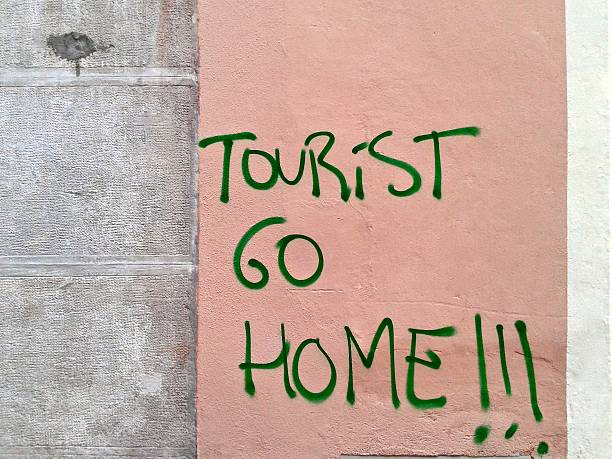
Europe is expecting a huge wave of tourists, and local businesses now rely more and more on foreign workers to keep hotels, restaurants, and other services running.
But behind the busy streets and tourist spots, there’s a bigger story. The rise in visitors puts extra strain on housing, water, and jobs—often making life harder for both the locals and the migrant workers who keep everything going.
Record-breaking visits stretch cities to the limit
Europe, often called the “world’s museum,” is now dealing with the effects of being a top travel spot. The U.N.’s World Tourism Barometer reported that in 2024, over 70% of global tourists went to Southern and Western Europe.
France, Spain, and Italy each saw more tourists than the number of people living there. In Greece, visitors outnumbered locals four to one.
Most tourists came from the United States, Japan, China, and the United Kingdom. Social media, travel apps powered by AI, and low-cost flights have made it easier than ever to plan a trip to Europe.
Locals push back as prices and tensions rise
In many cities, the tourism surge has caused more than just traffic—it’s disrupted daily life.
In Barcelona, protests have broken out. Activists use neon water guns to spray unsuspecting tourists while holding signs that say, “One more tourist, one less resident.”
Locals said that short-term rentals, especially through platforms like Airbnb, are pushing them out of the housing market. Landlords prefer renting to tourists, leaving long-term residents with fewer options.
“It’s combined with the gradual loss and displacement of other social and economic activities,” said Angelos Varvarousis, an academic and urban planner based in Barcelona and Athens.
In Greece, summer heat now comes with water shortages. Tourist hotspots like Mykonos and Santorini struggle to provide enough drinking water and electricity.
Culture and neighborhoods fade into monotony
The charm that once attracted tourists is starting to disappear. In popular areas of Spain, France, and Italy, local bakeries and bookshops are being replaced by souvenir shops and global coffee chains.
Critics called this shift a “tourism monoculture,” saying that Europe is giving up its unique character for convenience.
Even the Louvre, the world’s most-visited museum, had to close for a while after staff protested working conditions made worse by the flood of tourists.

Officials experiment with new rules and tools
With locals frustrated and public services stretched thin, governments are stepping in.
Spain ordered Airbnb to remove nearly 66,000 illegal listings and plans to end all short-term apartment licenses in Barcelona by 2028.
Italy’s Tourism Minister, Daniela Santanchè, said that tourism isn’t the problem. She supports managing visitor numbers by having people book tickets to busy spots like the Uffizi Galleries months ahead of time.
“Tourism must be an opportunity, not a threat—even for local communities,” she said.
Greece will start a new cruise tax on July 1st. Visitors will pay €20 to stop at popular islands like Mykonos and €5 for quieter places like Samos. The country is also using desalination and water tankers to help islands meet rising demand.
Venice has brought back its entry fee. Day visitors now pay up to €10 during peak season to enter the city’s historic center.
Visitors caught in the surge
Europe’s surging visitor numbers are transforming scenic cities into overcrowded hubs with overstretched resources.
For short-term tourists, this means longer queues, fees to access hotspots like Venice, and even museum shutdowns, such as the Louvre’s recent strike-induced closure.
Long-term visitors, including digital nomads, face rising housing costs as locals push back against short-term rentals.
These developments foreshadow stricter controls under the upcoming European Travel Information and Authorization System (ETIAS), where travel authorization could become contingent not just on security, but sustainability concerns as well, mirroring how Schengen visa policies increasingly factor in local impact.
Locals and migrants in the squeeze
As over tourism fuels housing shortages, migrant communities—especially in city centers—find themselves edged out.
Spain’s move to eliminate 10,000 short-term rentals in Barcelona by 2028 reflects attempts to preserve affordable housing for residents.
Yet for migrants often reliant on service-sector jobs, this policy shift cuts both ways—reducing housing access while potentially shrinking the very tourist-driven economy that employs them.
In cities like Athens and Barcelona, activists warn of a monoculture that displaces local and immigrant-led enterprises alike.

Rewriting the immigration playbook
The overtourism backlash is nudging EU countries to rethink immigration through the lens of urban resilience.
Policy moves such as Greece’s cruise taxes and Spain’s Airbnb restrictions signal a pivot toward controlling population pressures not only through border management but internal regulation.
As immigration debates intersect with tourism saturation, expect EU strategies to evolve—balancing economic gains from labor migration with local demands for livability, especially in overstretched hotspots like the Balearics and Santorini.
Balancing tourism’s boom with Europe’s breaking point
As Europe’s cobblestone streets groan under the weight of record-setting tourism, the clash between economic opportunity and local survival has never been starker.
While governments test AI-driven flow controls and cruise taxes, the clock is ticking to preserve both culture and community.
Whether overtourism becomes a managed marvel or an irreversible monoculture depends on bold, immediate action.
